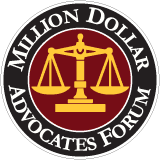Summers & Associates Can Explain Negligence, Misconduct, and More
For our September blog, we’re explaining how to know if you’ve lost someone via wrongful death. It’s accepted that Benjamin Franklin wrote, “…in this world nothing can be said to be certain, except death and taxes.”
While life certainly includes suffering the passing away of loved ones, sometimes wrongful death tragically compounds that loss. At Summers & Associates, we fight for damages due to wrongful death claims. Your loved one’s passing might have been a wrongful death if as a result of:
- Negligence
- Malpractice
- Misconduct
- And more
Negligence Includes Comparative, Contributory, Gross, and Vicarious
In the strictest of terms, negligence is the failure to take proper care while performing an action. Negligence also extends to omissions of care when there might be a duty to act. Sometimes civil trials result in a jury finding comparative or contributory negligence, though not usually in wrongful death cases. Wrongful death due to failure to act or omission of action can occur via gross or vicarious negligence.
Gross Negligence
Gross negligence causing a wrongful death means demise resulting from one’s extreme indifference or reckless disregard. The driver of a speeding a vehicle through a pedestrian-congested area who kills a pedestrian commits gross negligence.
Gross negligence also includes a doctor prescribing medication listed on a patient’s medical records as an allergy. Nursing home staff not providing a resident food for days, resulting in that resident’s death, is guilty of gross negligence.
Vicarious Negligence
Vicarious negligence deems one party partly responsible for the actions of a third party. A jury can determine this type of negligence regardless of the plaintiff’s actual participation in the negligent act. Vicarious negligence could apply in the aforementioned gross negligence cases.
A jury could determine vicarious negligence via the owner of the speeding vehicle, if different than the driver. The hospital for which the doctor works and the nursing home corporation could also be found guilty of vicarious negligence.
PS: Don’t Forget About Contributory and Comparative Negligence
Contributory negligence means a civil plaintiff won’t recover any damages if deemed even one percent at fault. Only five states and the District of Columbia still observe contributory negligence guidelines.
Comparative negligence applies when a jury deems both a civil plaintiff and defendant negligent. W.V. code 55-7-13A outline the comparative negligence standard for all West Virginia civil claims. In 1980, Ohio enacted a comparative negligence law (Section 2315.33,) becoming the 35th state to do so.
Wrongful Death Via Malpractice Results from Improper Activity
Wrongful death via malpractice results from a professional’s improper activity directly causing the death. Similar to negligence, malpractice can occur if defendants were duty bound to act in professional capacity but didn’t do so. The most common occurrence of a wrongful death due to malpractice is via medical malpractice.
Learn About Examples of Wrongful Death from Medical Malpractice
- A primary care practitioner fails to diagnose a fatal condition.
- Errors during surgery result in the patient’s death.
- A mother or infant suffer fatal injuries at birth.
- Delaying terminal cancer patients’ treatments.
- An emergency room resident prescribes a fatal dosage of medication.
Courts Consider Prosecuted Murder As Wrongful Death by Misconduct
The demise of someone due to the misconduct of another is considered a wrongful death. Generally, misconduct breaks down into minor or gross misconduct, though wrongful death only tends to result from gross misconduct. Health and safety breaches in a workplace that result in a person’s death are examples of misconduct.
Even surviving members of a murder victim’s family can sue the convicted murderer for wrongful death due to criminal misconduct. Lawsuits related to wrongful deaths due to police misconduct include unjustified shootings, excessive force, and fatal taser injuries.
Judges Often Award Monetary Damages in Wrongful Death Claims
When pursuing a wrongful death civil lawsuit, the endgame is almost always financial compensation, aka damages. If successful, plaintiffs either receive damages in a settlement or via a trial. Plaintiffs usually present testimony and evidence to establish the negligence, misconduct, or malpractice, plus the value of the decedent.
After hearing evidence in a civil wrongful death trial, the judge or jury determines the damages to award. The court may adjust size of the award, as the jury’s determination is not always final. Two types of damages often awarded in wrongful death lawsuits include pecuniary and punitive. Here is a definition of the two:
Pecuniary Damages
Pecuniary damages mean financial injury. They take into consideration the age, character, and decedent’s condition. The decedent’s earning capacity, life expectancy, health and intelligence, plus the circumstances of the recipients, also come into play.
Punitive Damages
Juries mostly award punitive damages due to serious or malicious negligence, misconduct, or malpractice. It’s a means to essentially punish the wrongdoer, or deter others from conducting themselves similarly. Most states don’t allow plaintiffs to recover punitive damages in wrongful death suits. In Ohio, wrongful death punitive damage awards hardly ever occur.
Some states, however, have statutes that permit awarding limited punitive damages for a wrongful death. In West Virginia, courts may award punitive damages in certain wrongful death cases. In most cases, W.V. juries award wrongful death punitive damages when the defendant’s negligence, malpractice, or misconduct is especially heinous.
For more information on legal services, give Summers & Associates a call at (304) 420-0975. Follow us on FACEBOOK for updates. We are happy to explain more about how to know if you’ve lost a loved one via wrongful death.








